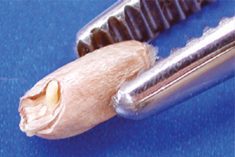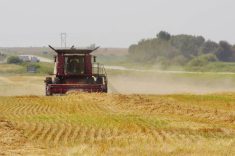Wheat sold at a loss
The 2009 crop took a year to get all the money from the Canadian Wheat Board. My cost to plant and harvest 160 acres was $25,897. When I got my last payment of $23,686 I lost $2,211 and did not charge for labour.
I got $2.45 per bushel for No. 1 wheat with charges for cleaning and freight. What a joke; my cost to plant was $160 per acre and I got paid $147 per acre, for a loss of $14 per acre on a 60-bushel crop. I was with the wheat board all those years and got to be the first to get the 50-year award. I guess I will have to sell my grain to other companies; wheat should sell for $6 to $7 in order to keep farming with all the high costs.
Read Also

Manitoba Ag Days plans star-studded speaker lineup
Dragons’ Den panellist Arlene Dickinson among speaker series highlight for 2026 Manitoba Ag Days in Brandon, alongside slate of agriculture experts.
Jack Pawich Cartwright, Man. that won the day. I would be interested to know what formal training or practical experience on rail costing that John DePape has on his resumé. Travacon has determined that railways save $3 per tonne when they make one stop to pick up 100 hopper cars. Farmers are now asking why the railways use an $8 incentive for a $3 saving. If John thinks the saving is different than $3, does he have an analysis, or is he simply being coached by the railways?
The CWB plays a vital role in transportation and their level-of- service complaint in 1997 resulted in $30 million being returned to farmers from the CPR and an undisclosed settlement from CN Rail.
The Canadian Wheat Board played a major role in the positive CTA decision that, during the 2006-07 crop year, CN breached its legal obligations to provide adequate rail service. The CWB supported these farmers and several inland terminals involved. There are numerous other examples of the CWB’s positive role in transportation.
What actual results has DePape provided to farmers?
We know that DePape has worked for Cargill Ltd., Sparks Commodities Ltd., the Winnipeg Commodity Exchange, the Alberta government and the Frontier Centre for Public Policy. The Frontier Centre has noted CWB haters Al Loyns, Charlie Mayer, and Rolf Penner all playing prominent roles.
DePape is also listed as an adviser to the Alberta-government- funded Alberta Barley Growers Association.
As renowned American author Mark Twain once stated, “Tell me whar a man gits his corn pone, en I’ll tell you what his ‘pinions’ is.”
In his essay, Twain explained that a man is not independent, and cannot afford views which might interfere with his bread and butter. Twain, if he were around today, would describe DePape as having “corn pone” opinions. That is, opinions very related to his past, his present and future financial well-being. Kenneth Sigurdson
Swan River, Man. have. There never was support for the open-market candidates, even though they may have had resources from taxpayers and corporations to win the CWB elections.
Some farmers today sell their grain production to hog and cattle operations and feed mills. There are no regulations for any farmer stating he or she must sell only to the CWB.
There are no more public farmer meetings where farmers can discuss the problems in farm policies. Gerry Ritz only works with the media, makes all the changes in farm policies without real input from farmers and we as farmers cannot change his mind. And if we oppose his view, Gerry Ritz will crucify farm groups or individuals. Farmers have been divided too many times by the Tory government over the past five years.
The CWB is the last organization that farmers have left with any rules or regulations that treat all farmers equally. It’s beneficial for young and other farmers to know that all sales money made on their product will be returned to them and not the shareholders.
Eric Sagan Melville, Sask.
Farmers on the fringe of benefits
I must disagree with John DePape (CWB director has his facts wrong,Co-operator,Feb. 3, page 5) when he says that “farmers in general are the greatest beneficiary of the efficiencies of multi-car loading.” As a result of the introduction of the revenue cap, multi-car incentives have not come out of the railways’ pockets, yet they keep all the savings created by multi-car loading. When the Grain Monitor hired by the federal government was asked this question at the 2010 Hudson Bay Route Association convention, he said farmers had not been the primary benefactors of the efficiency gains. John DePape is mistaken.
Sinclair Harrison Chairman, Farmer Rail Car
Coalition Moosomin, Sask.
Please forward letters to Manitoba Co-operator, 1666 Dublin Ave., Winnipeg, R3H 0H1 or Fax: 204-954-1422 or email: [email protected] (subject: To the editor)
















